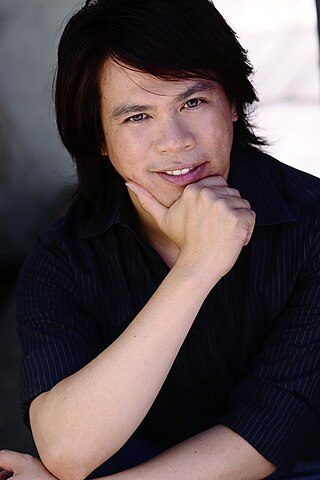Related Research Articles

The Don Carlos Palanca Memorial Awards for Literature, popularly known as the Palanca Awards, are a set of literary awards for Philippine writers. Usually referred to as the "Pulitzer Prize of the Philippines," it is the country's highest literary honor in terms of prestige. It was named after Carlos Palanca Sr., the Chinese Filipino businessman and philanthropist.
The 49th Don Carlos Palanca Memorial Awards for Literature was held to commemorate the memory of Don Carlos Palanca Sr. through an endeavor that would promote education and culture in the country. This year saw the inclusion of a new Kabataan Division with two categories, open for Essays/Sanaysay in English and Filipino.
The 48th Don Carlos Palanca Memorial Awards for Literature was held to commemorate the memory of Don Carlos Palanca Sr. through an endeavor that would promote education and culture in the country. This year saw the inclusion of a new Regional Language Division with three categories, open for short stories in three regional languages, Cebuano, Hiligaynon, and Iluko.
The 50th Don Carlos Palanca Memorial Awards for Literature was held on September 1, 2000, at The Peninsula Manila in Makati to commemorate the memory of Don Carlos Palanca Sr. through an endeavor that would promote education and culture in the country. This year saw the inclusion of a new a new category, Future Fiction, open for short stories that deal with the future of the Philippines or the future of Philippine writing, in English and Filipino.
Philippine literature in English has its roots in the efforts of the United States, then engaged in a war with Filipino nationalist forces at the end of the 19th century. By 1901, public education was institutionalized in the Philippines, with English serving as the medium of instruction. That year, around 600 educators in the S.S. Thomas were tasked to replace the soldiers who had been serving as the first teachers. Outside the academe, the wide availability of reading materials, such as books and newspapers in English, helped Filipinos assimilate the language quickly. Today, 78.53% of the population can understand or speak English.
Leoncio P. Deriada was a Filipino writer and professor emeritus of creative writing and literature at the University of the Philippines in the Visayas in Iloilo.
Ligaya G. Tiamson-Rubin, is a Filipino writer. A multiple Carlos Palanca Memorial Awards for Literature recipient, and currently a professor of the University of the Philippines Diliman. Today, she is teaching Filipino 25, Mga Ideya at Estilo under the Department of Filipino and Philippine Literature at the College of Arts and Letters, University of the Philippines Diliman in Diliman, Quezon City.

Peter Solis Nery is a Filipino poet, fictionist, author, and filmmaker. Writing in Hiligaynon, he is a Carlos Palanca Memorial Awards for Literature Hall of Fame Awardee, the Cultural Center of the Philippines (CCP) Literary Grant, and the All-Western Visayas Literary Contest winner. In 2015, he became the first Filipino author to be invited to the Sharjah International Book Fair in the United Arab Emirates. Writing in English, Filipino, and Hiligaynon, he has authored at least 35 books, and has written screenplays. He wrote and edited newspapers in Iloilo City before becoming a nurse in the United States.
The 61st Don Carlos Palanca Memorial Awards for Literature was held on September 1, 2011, at The Peninsula Manila in Makati to commemorate the memory of Don Carlos Palanca Sr. through an endeavor that would promote education and culture in the country. National Artist for Literature Francisco Sionil Jose was Guest of Honor and Speaker at this year’s awarding ceremony.
The 62nd Don Carlos Palanca Memorial Awards for Literature was held on September 1, 2012, at The Peninsula Manila in Makati to commemorate the memory of Don Carlos Palanca Sr. through an endeavor that would promote education and culture in the country. This year, the Palanca received a total of 1,077 entries in 20 categories. Out of these submissions, 59 winning works were selected from 58 writers – with half are first-time winners. Department of Tourism Secretary Ramon R. Jimenez Jr. was Guest of Honor and Speaker at this year’s awarding ceremony.
Genevieve L. Asenjo is a Filipino poet, novelist, translator and literary scholar in Kinaray-a, Hiligaynon and Filipino. Her first novel, Lumbay ng Dila, received a citation for the Juan C. Laya Prize for Excellence in Fiction in a Philippine Language in the National Book Award.

Peter’s Prize or The Peter Solis Nery Prize for Excellence in Hiligaynon Writing is a literary contest in the Hiligaynon language of the Philippines established by The Peter Solis Nery Foundation for Hiligaynon Literature and the Arts, Inc. in 2013 to fulfill its mission to promote, preserve, and propagate Hiligaynon literature. It was expanded to special prizes for excellence in literary scholarship and cultural work, and additional competitive prizes in the various art forms in its succeeding years. It was named after foremost Hiligaynon (Ilonggo) writer Peter Solis Nery from Dumangas, Iloilo.
The 64th Don Carlos Palanca Memorial Awards for Literature was held on September 1, 2014, at The Peninsula Manila in Makati to commemorate the memory of Don Carlos Palanca Sr. through an endeavor that would promote education and culture in the country. Gilda Cordero-Fernando was Guest of Honor and Speaker at this year’s awarding ceremony.
Hiligaynon literature consists of both the oral and written works in Hiligaynon, the language of the Hiligaynon people in the Philippine regions of Western Visayas and Soccsksargen.
The Wide Ionian Sea is a play in English by Filipino playwright Peter Solis Nery. It was awarded as the sole winner in the one-act play category of the Palanca Awards for Literature in 2010.
Tic-tac-toe is a comedy by multi-awarded Filipino poet and playwright Peter Solis Nery, who won first prize at the 2016 Palanca Awards for this one-act play. It is the most frequently produced - and touted as the funniest - English-language play in Iloilo City in the new millennium.
Gladiolas is a one-act play in the Filipino language by Philippine poet and playwright Peter Solis Nery. It was the first prize winner at the 2014 Palanca Awards for Literature.
Lirio may refer to:
The 70th Don Carlos Palanca Memorial Awards for Literature was held on November 30, 2022, at the Marquis Events Place in Bonifacio Global City in Taguig to commemorate the memory of Don Carlos Palanca Sr. through an endeavor that would promote education and culture in the country. The traditional ceremony was held after a two-year hiatus due to the COVID-19 pandemic. A total of 59 writers, 28 of whom were first-time awardees, were chosen as this year's recipients. The total number of writing categories awarded was 22, with the categories for the Novel and the Nobela open this year, with the surprise addition of a Special Prize for each. Dr. Nicanor G. Tiongson was Guest of Honor and Speaker at this year's awarding ceremony.
The 71st Don Carlos Palanca Memorial Awards for Literature was held on November 27, 2023, at the Philippine International Convention Center in Pasay City to commemorate the memory of Don Carlos Palanca Sr. through an endeavor that would promote education and culture in the country.
References
- ↑ "Lirio – Peter Solis Nery". 14 July 2014.
- ↑ Directory of Palanca Winners, at PalancaAwards.com.ph
- ↑ Nery, Peter (10 December 2012). Stories in a Mellifluous Language: Hiligaynon Short Stories. CreateSpace Independent Publishing Platform. ISBN 978-1481043076.
- ↑ "LIRIO, in English translation – Peter Solis Nery". 14 June 2017.
- ↑ Nothing's Lost: Stories by Peter Solis Nery. Independently published. 12 May 2020. ISBN 979-8637156863.
- ↑ ISBN 978-971-46-0995-2